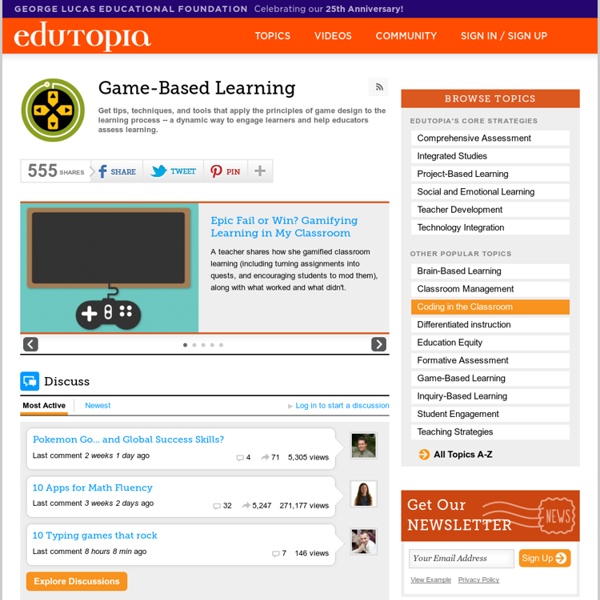



http://www.edutopia.org/blogs/beat/game-based-learning
Evolution of Home Video Game Consoles: 1967 – 2011 Video gaming has come a long way since the early days of Pong and Pac-man. We can now play affordable games of high calibre with 3D graphics and awesome interactivity in the comfort of our home, taking for granted the little and subtle improvements made to each and every consoles before becoming what they are today. In a way, the aggressive competition between companies of video game consoles had churned out the superior features of video gaming to bring to us the excellent quality we see today. Katie Salen on the Power of Game-Based Learning (Big Thinkers Series) Student: It's really cool school. I've never gone to a school quite like it. Student: Well, we get to design games and play each other's games, so instead of just doing work, work, work all day. Student: Well, we have the basic classes of a school, but we gave them different names, like math is called Code World. Science is the Way Things Work. Student: We learn everything that all the other schools learn.
Pharaohs Quest : Comic maker LEGO, the LEGO logo, DUPLO, LEGENDS OF CHIMA, MINDSTORMS, MIXELS and the Minifigure are trademarks of the LEGO Group. ©2014 The LEGO Group. All rights reserved. Use of this site signifies your agreement to the terms of use. TM & © DC Comics. WoWinSchool / FrontPage This is a collaborative workspace for the development of instructional items for the use of MMORPGs, like World of Warcraft, GuildWars2 and others, in a school setting. Please take a moment to explore the various sections of the site and if you would like to contribute, please email Lucas Gillispie at lucas AT edurealms.com. The original focus of this project was to develop a curriculum for an after school program or "club" for at-risk students at the middle and/or high school level. This program would use the game, World of Warcraft, as a focal point for exploring Writing/Literacy, Mathematics, Digital Citizenship, Online Safety, and would have numerous projects/lessons intended to develop 21st-Century skills. Because of the success of the first year's implementation as an after school program, the program is now being implemented as a language arts elective for middle schoolers designed to provide enrichment for students at all levels. The program is spreading, too.
Creator Processing ... Personal $ Svg $20 ✓ Up to $75 merchandises for personal use. Merchandise $ License to use artwork in merchandises (T-Shirt, Mug, poster, etc). Three Ways Game-Based Learning can be a Helpful Tool “A game is an opportunity to focus our energy, with relentless optimism, at something we’re good at (or getting better at) and enjoy. In other words, gameplay is the direct emotional opposite of depression.” Jane McGonigal, Reality is Broken: Why Games Make Us Better and How They Can Change the World Game-based learning is fast becoming a trend in education. Create Something. Donate Login Remember Me Game-Based Learning: What it is, Why it Works, and Where it's Going Education is not the filling of a pail, but the lighting of a fire. –William Butler Yeats Introduction Deconstruct the fun in any good game, and it becomes clear that what makes it enjoyable is the built-in learning process. To progress in a game is to learn; when we are actively engaged with a game, our minds are experiencing the pleasure of grappling with (and coming to understand) a new system. This is true whether the game is considered “entertainment” (e.g., World of Warcraft) or “serious” (e.g., an FAA-approved flight simulator).
ARKive - Discover the world's most endangered species Wildscreen's Arkive project was launched in 2003 and grew to become the world's biggest encyclopaedia of life on Earth. With the help of over 7,000 of the world’s best wildlife filmmakers and photographers, conservationists and scientists, Arkive.org featured multi-media fact-files for more than 16,000 endangered species. Freely accessible to everyone, over half a million people every month, from over 200 countries, used Arkive to learn and discover the wonders of the natural world. Since 2013 Wildscreen was unable to raise sufficient funds from trusts, foundations, corporates and individual donors to support the year-round costs of keeping Arkive online.
Atlantis Remixed Transformational play involves the use of virtual worlds to help people learn and grow in a context where they can fail safely. Theory At its core, transformational play is a learning and empowerment philosophy that is grounded in the belief that each one of us is capable of, wants to, and deserves to achieve, great things. Unlike any other form of curriculum, these games offer entire worlds in which learners are central, important participants; a place where the actions of a ten-year old can have significant impact on the world; and a place in which what you know is directly related to what you are able to do and, ultimately, who you become. The theory highlights relations among the three interconnected elements of person with intentionality, content with legitimacy, and context with consequentiality.